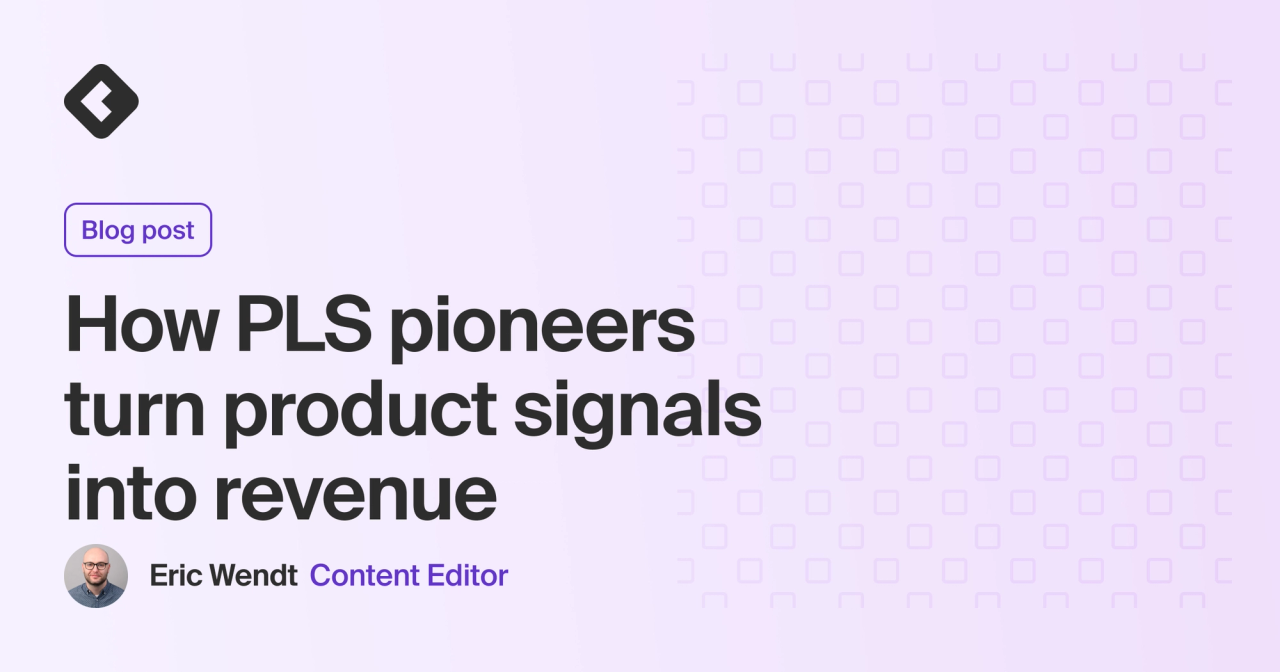Product-led sales solves lots of problems.
Free trials and freemium plans help spotlight buying intent and give reps a reason to reach out to sales-averse prospects.
But PLS creates problems of its own. Reps spend too much time sifting through an ocean of anonymous sign-ups, tabbing between spreadsheets and dashboards built for technical teams, and chasing end users instead of economic buyers.
Now for the upside: It’s more than possible to transform a firehose of product usage data into a lean, mean, pipeline-generating machine.
Here’s how organizations like Zapier, Notion, and Semgrep power revenue growth with product signals using Common Room.
See the person in the product
Problem
Free trialists often sign up to test out products with their personal email addresses. This makes it difficult to connect the dots between Gmail accounts and target accounts.
Figuring out which product users to prioritize—and tailoring outreach based on account research—is a challenge.
Solution
Our customers use AI-powered identity resolution and waterfall enrichment to see the people and companies behind every sign-up.
Person360™ automatically reveals the contacts and accounts behind product usage data, as well as demographic, firmographic, and behavioral details. Granular product activity is served up alongside names, job titles, work histories, contact information, company size, annual revenue, and much more.
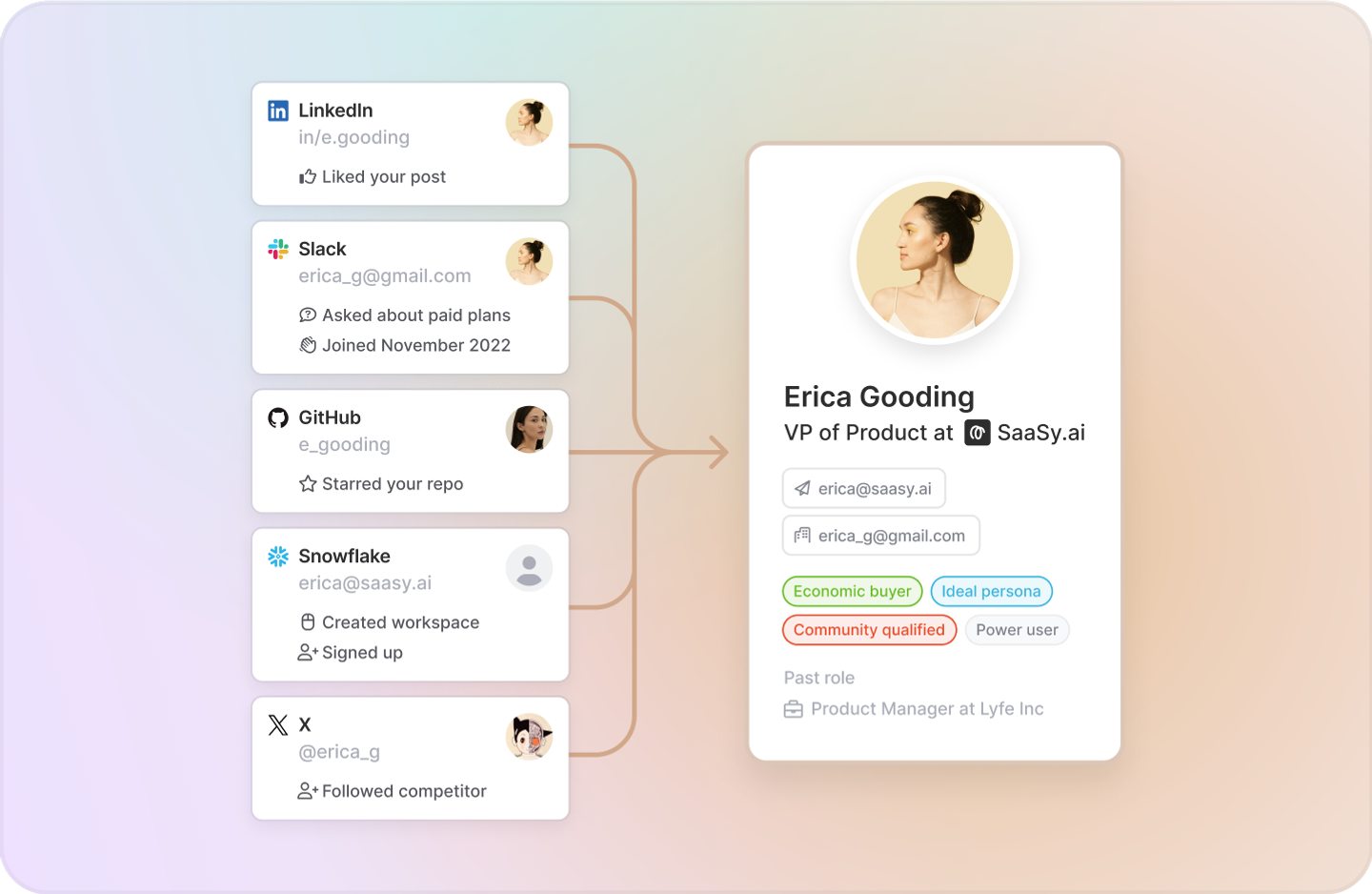
Common Room’s out-of-the-box identity and enrichment engine uses machine learning models to automatically deanonymize contact and account activity, merge cross-channel signals into unified profiles, and fill in the blanks with rich contextual data.
Our AI-powered signal capture also makes it easy to paint a picture of prospects outside of the product. Buying signals from across the digital landscape—like web visits, social engagements, and more—are automatically collected and added to a unified profile for all contacts and accounts.
AI-powered signal captureCommon Room’s AI-powered signal capture automatically fetches contact, account, and activity data from your first-, second-, and third-party data sources. Our machine learning algorithms process this data and turn it into structured outputs for team members to access, analyze, and action on.
Go-to-market teams use fully customizable tags to surface product-qualified leads, economic buyers, ideal personas, and more—automatically and at scale.
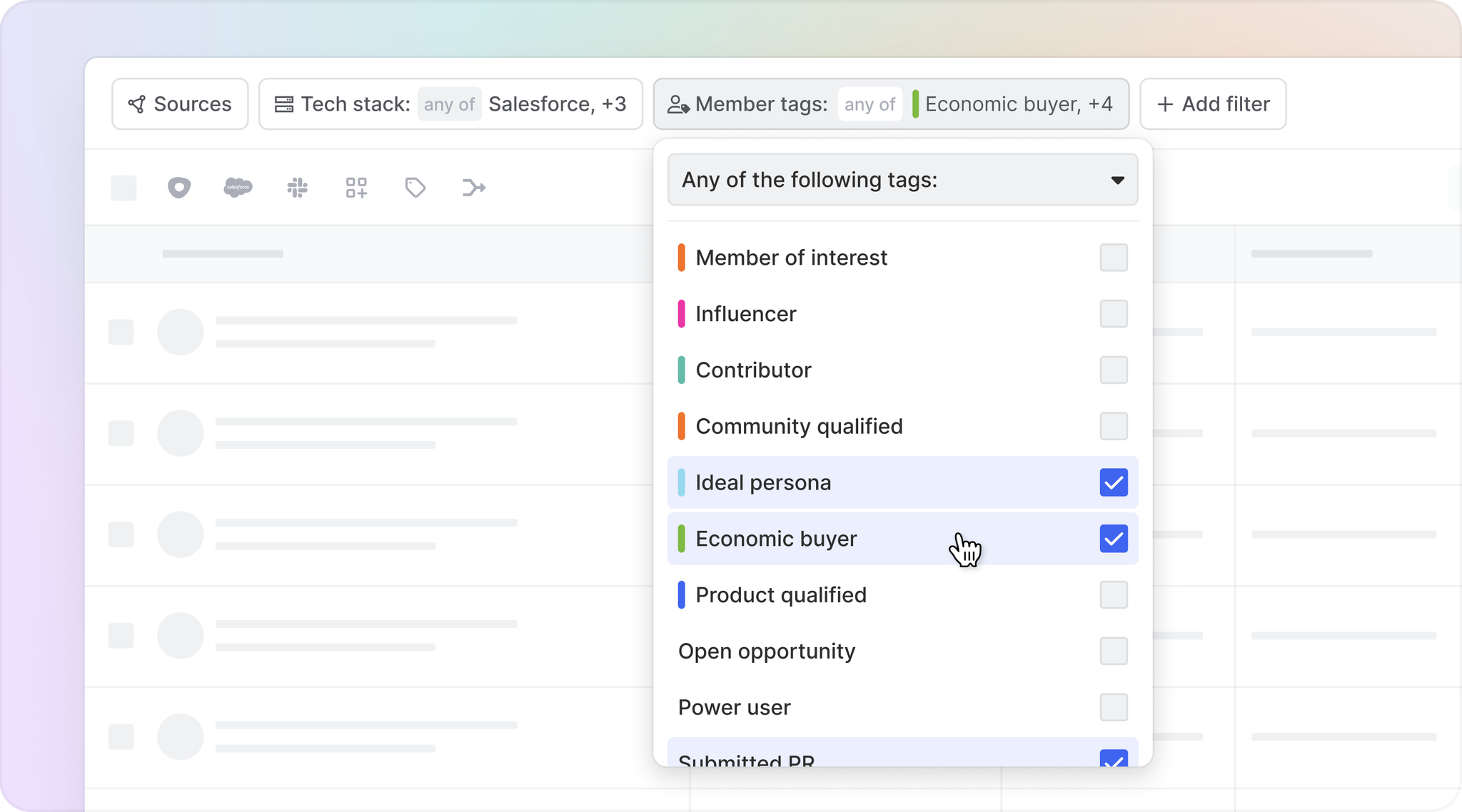
This makes it easy to zero in on high-fit buyers fast.
Strategy
Zapier uses Person360 and auto-tagging to hone in on budget holders lightning-quick.
“Common Room gives me a view of all the important contacts at one company,” said Strategic Account Manager Cathy Du. “All the info I need is all in one place and easy to sort through. It helps me find important contacts to outreach, understand who they are, and prioritize who’s most relevant.”
Product usage data is combined with signals from across LinkedIn, X (Twitter), Intercom, HubSpot, and other data sources to increase visibility into accounts and spotlight ideal customer profiles.
Director-level stakeholders and above are served up to reps automatically.
Results
Surfacing the right personas at speed helped Zapier increase meetings booked by 31% in 3 months.
"Reaching the right stakeholders is critical to building a repeatable sales motion and increasing ACVs,” said Vice President of Sales and Customer Success Nalin Vahil. “Our teams had to jump back and forth between multiple tools to do that, and we were still missing key insights. With Common Room, we can identify the right stakeholders faster."
Simplify product activity tracking
Problem
Seeing exactly what users are doing in the product usually means tabbing back and forth between GTM-unfriendly analytics tools.
Even if reps get access to relevant product usage data, there’s no way to take action on it from a static spreadsheet or dashboard.
Solution
Our customers use native integrations with their business data sources to pump product usage data directly into Common Room.
Custom product entities let teams customize how product data is ingested and displayed, making it easy to track specific activities associated with any account, like the number of users within a workspace or how often a certain feature is used.
Native integrationsCommon Room’s natively built and fully managed integrations sync your stack with an AI-powered system of intelligence. Integrations include popular data warehouses and customer data platforms like Snowflake, BigQuery, Databricks, Segment, Hightouch, Census, and more.
Calculated fields allow teams to quickly see which accounts are generating the most volume of certain product activities and use this information to power signal-based scoring.
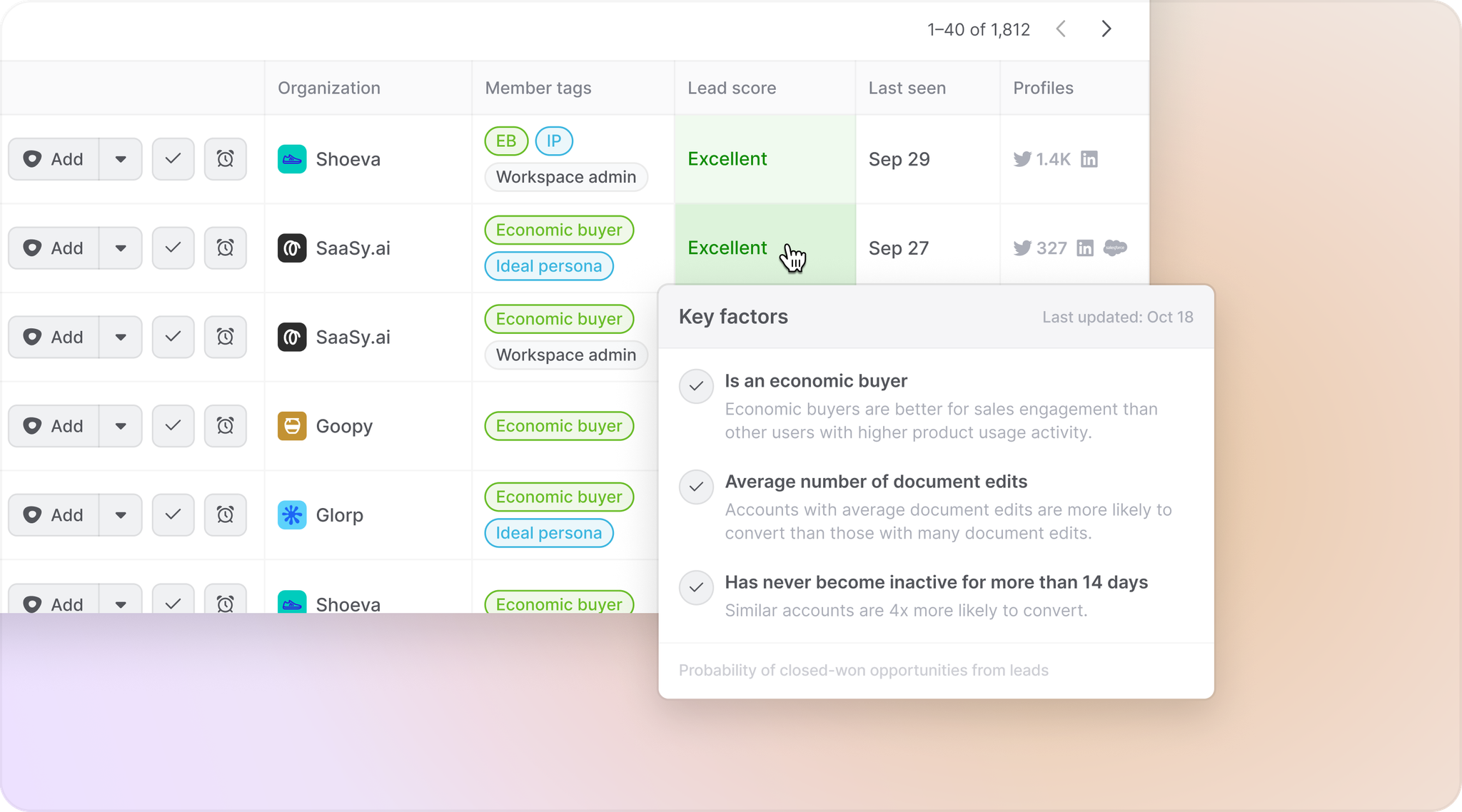
Common Room’s signal-based scoring creates contextual lead and account scores based on machine learning-enriched fit and behavioral data. Scores—and the context behind them—are refreshed daily using your custom rules, parameters, and weighting.
Meanwhile, automated alerts keep teams up to date on product activity in real time.
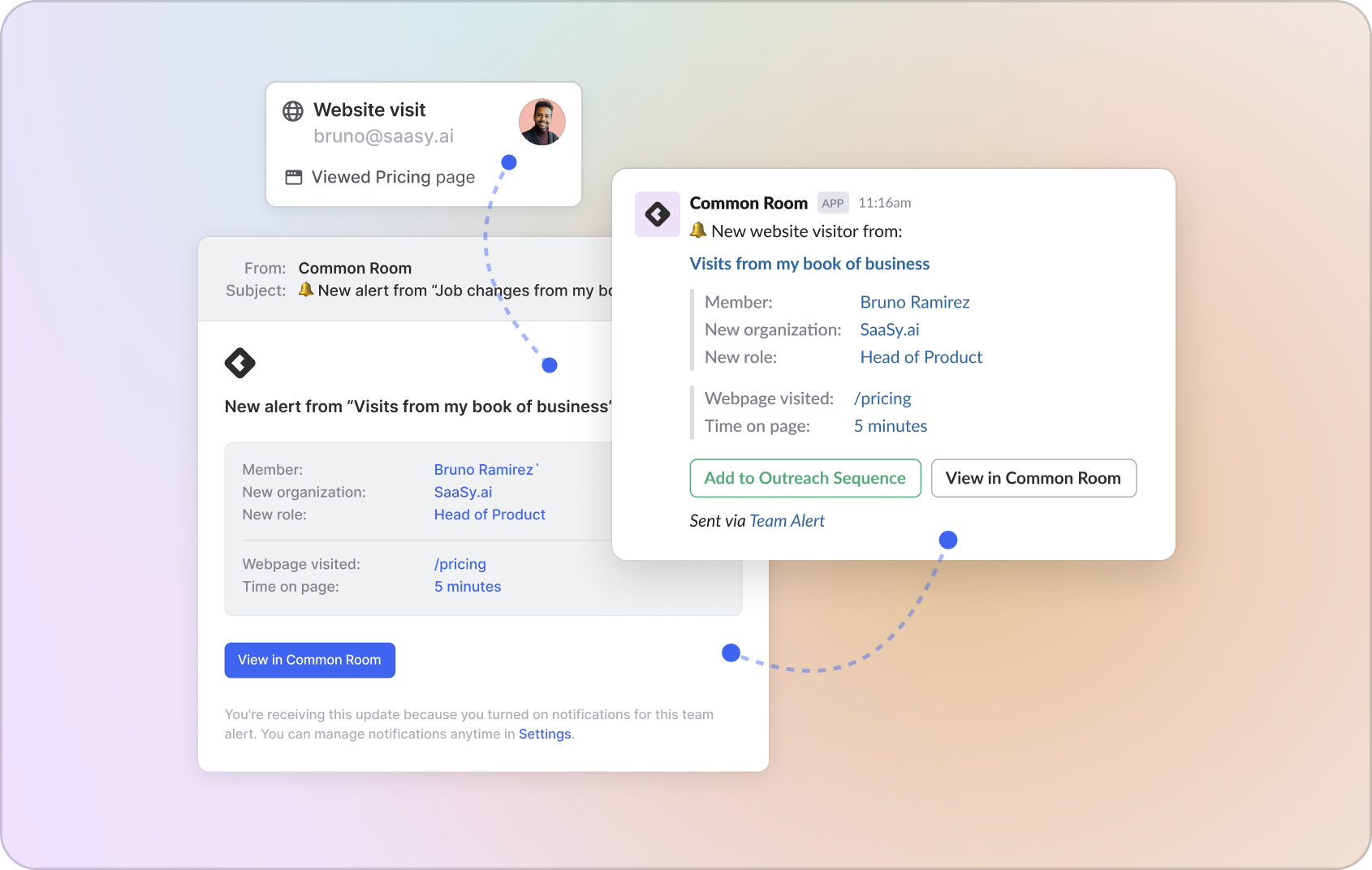
Common Room’s intelligent automations build real-time alerts using your custom filtering criteria, automating notifications based on any combination of contact, account, and activity signals.
Reps can quickly see what specific contacts and accounts are doing in the product and action on this activity directly from Common Room.
Our customers use integrations with popular sales execution platforms—like Outreach, Apollo, Salesloft, Gong Engage, and more—to add PQLs to personalized outbound sequences without switching screens.
Strategy
Notion uses custom product entities and automated alerts to help reps dig into granular product usage data for specific workspaces and stay updated on activity as it happens.
Reps are notified in Slack as soon as someone from an ICP-match account takes a certain action in the product that aligns with a purchase, upsell, or consolidation opportunity.
Reps can then action on these prospects—like syncing their records with Salesforce, adding them to an outbound sequence in Outreach, or even sending them a Slack DM—all from the same place.
“The phrase that keeps coming up from reps is ‘game changer,’” said Aiden Blake, Head of Inside Sales, EMEA. “One of my SDRs says Common Room saves him 5x time, which is just huge for us.”
Results
Improving rep visibility into product activity and accelerating speed to lead helped Notion generate 30% more meetings per rep per month.
“The results speak for themselves,” said Chief Revenue Officer Erica Anderson. “Common Room helps us reach the right people with the right message at the right time—faster and easier.”
Multithread purchase decision-makers
Problem
Product users aren’t always product buyers.
Climbing the ladder from end user to economic buyer is often a tedious, time-consuming process.
Solution
Our customers use our prospecting agent to find and enrich economic buyers who may not be active in the product.
Reps can click into any account associated with product activity, set filters for job title, location, and even LinkedIn follower count, and let Prospector fill in the blanks.
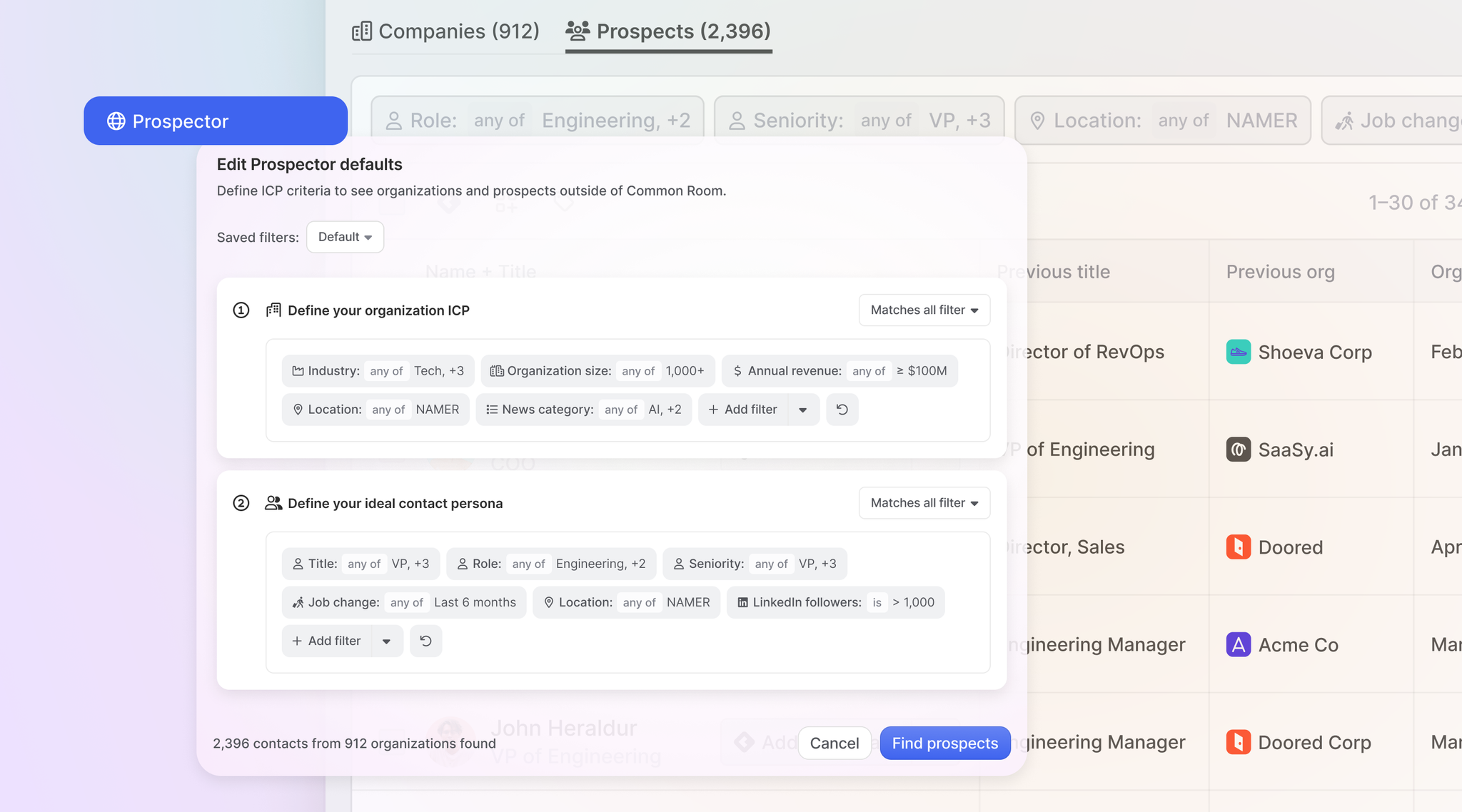
Common Room’s prospecting agent retrieves prospects and companies from a proprietary, constantly refreshed database of more than 200 million B2B contacts and accounts based on your custom filtering criteria. These people and organizations are then enriched via machine learning-powered models.
This process can be automated from end to end via fully customizable workflows.
Prospector will automatically find contacts at accounts based on preset filtering criteria and add them to dedicated segments.
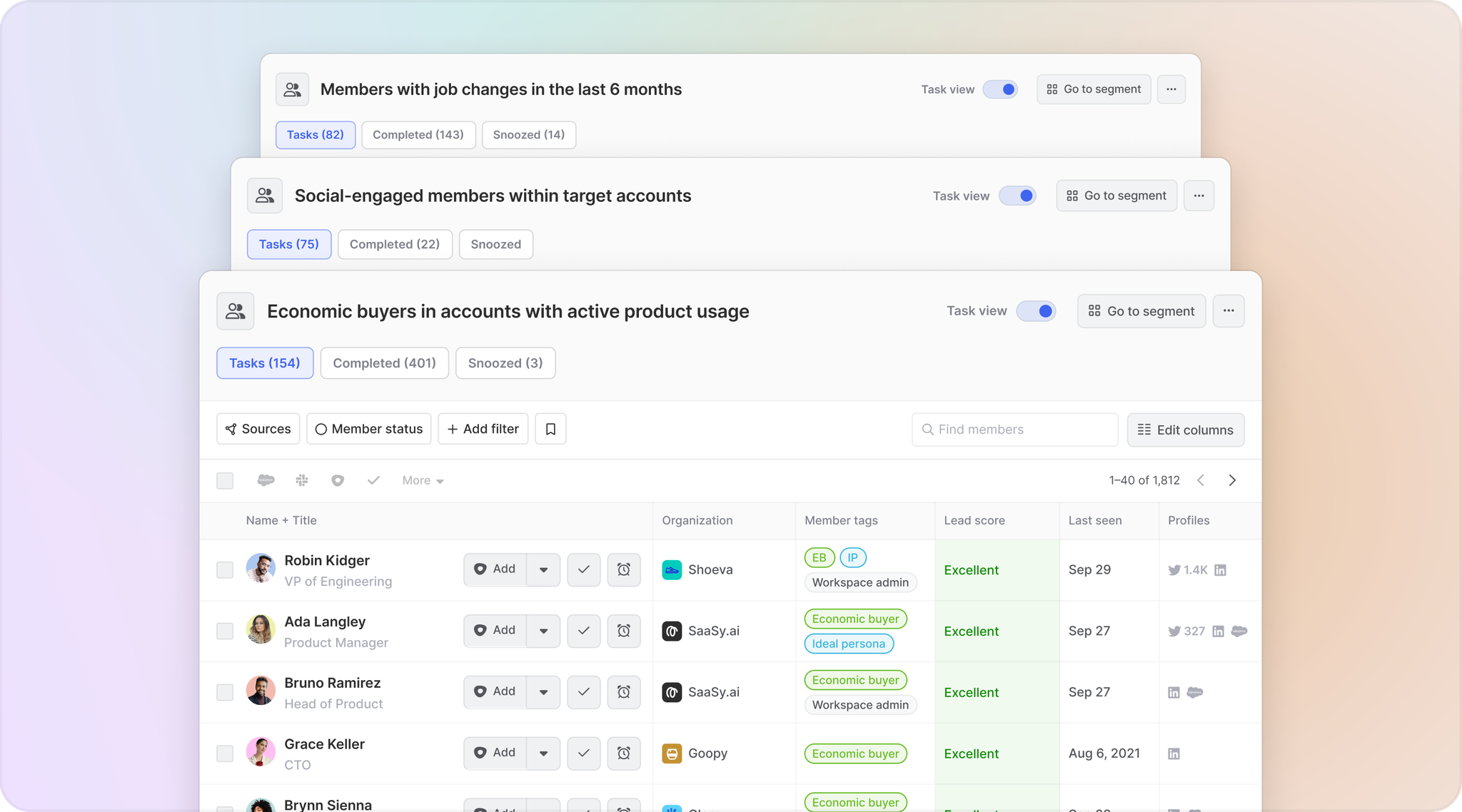
Common Room’s intelligent automations build auto-replenishing segments using your custom filtering criteria, automating play creation based on any combination of contact, account, and activity signals.
These contacts can then be added to prebuilt outbound sequences in an SEP automatically.
And with RoomieAI™, reps can auto-generate personalized, relevant messaging for each contact within a segment based on product activity or other signals captured in Common Room.
Messaging agentCommon Room’s messaging agent automatically pushes signal data to a self-learning large language model to craft personalized, relevant messaging at scale. Dynamic variables are controlled by you and updated in real time based on contact-, account-, and activity-level data.
This makes it possible to automate the entire sales process—from prospecting to personalization to engagement—with zero human input.
Strategy
Semgrep uses Prospector to find decision-makers who may not be tracked in its product.
“Prospector is definitely one of our favorite features,” said Director of Sales Development Jason Klumpp. “It helps us unify multiple jobs to be done—account research, multithreading—all in one place.”
Reps use custom filtering criteria to find above-the-line stakeholders at target accounts and add them to Common Room, where they’re automatically enriched.
From here, reps outbound economic buyers using account-specific insights derived from product activity, web visits, social interactions, and more.
Results
Making it easy for reps to identify and engage prospects both inside and outside of the product helped Semgrep grow pipeline by 74% in a single quarter.
“Common Room’s scope is a competitive differentiator,” Jason said. “It has more integrations, more signals, more ways to see where prospects are engaging with us. I felt like I was buying an AI copilot, enrichment tool, product tracking tool, website tracking tool, social tracking tool, and job-change tracking tool all at the same time.”
See the real people behind product usage, make product analytics rep-friendly, and build a 360-degree view of the buying committee.
That’s how Common Room customers power revenue growth with product signals.
Perfect product-led sales with Common Room
Get started for free or get in touch to see how Common Room’s AI-powered customer intelligence platform helps you capture, enrich, and take action on every buying signal.
